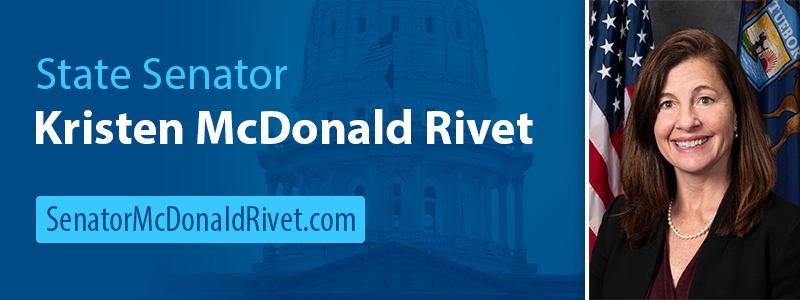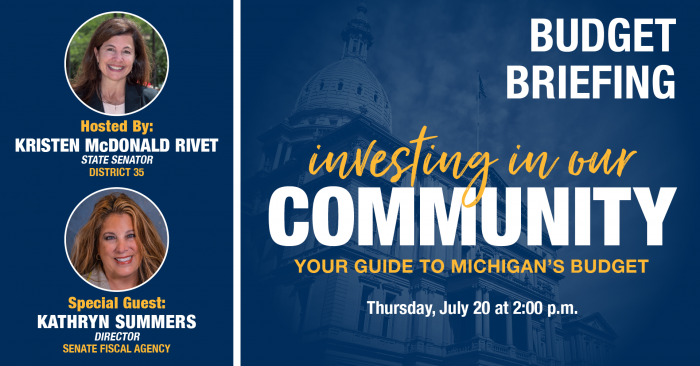Friends & Neighbors,
In late June, the Michigan Legislature passed the first state budget crafted by Democratic leadership in 40 years— a pragmatic, people-first budget that earned bipartisan support. We budgeted our values and prioritized the kitchen table issues we heard about time and again last year in countless connections with residents, school and local officials, business and community leaders.
This Fiscal Year 2024 State Budget is a big win for our Great Lakes Bay Region. Beyond general statewide appropriations, I’m thrilled about the nearly $100 million dollars being invested into our communities for targeted projects in education, infrastructure and economic development. Whether you’re a student, worker or retiree — or live in Bay, Midland or Saginaw counties — you’ll have more paths to thrive.
This e-newsletter edition focuses solely on the state budget, because I want you to know about these substantial investments in you, your family, neighbors and community. It’s also why I’m holding a budget briefing over Zoom for community members on Thursday, July 20 beginning at 2 p.m. Learn more here.
We also have several in-district opportunities to connect this summer and, as always, you’re welcome to contact us here if you can’t make our in-person events.
Sincerely

Kristen McDonald Rivet
State Senator, District 35
(517) 373-1725
PO Box 30036
Lansing, MI. 48909
SenKMcDonaldRivet@senate.
Real Savings
Impact figures from the 2024 state budget:
- Savings for families with Pre-K for All = $10,000 a year
- Per student savings with free breakfast & lunch in school = $850+ a year
- Savings from retirement tax rollback = $1,000 a year average
- New average refund from the Working Families Tax Credit = $3,150
- My legislation increased our state match of the federal Earned Income Tax Credit to 30% and raised this refund by an average of $600 per family. This will return an estimated $553 million to local economies each year.
- Savings on essential medical services with expanded Plan First! = $2,000 a year
Real Issues
If we want to attract top talent and increase high-paying industries and jobs here, we need to invest in things that make people want to live here — housing, education, workforce development, placemaking, public health and safety. These are the real issues people care about. These are the real investments we delivered.
Public Health & Safety — Statewide Investments
- 85-Cent-Per-Hour Wage Increase | for direct care workers and non-direct staff at long-term care facilities ($140 million appropriation in DHHS budget). This helps address the shortage of staff needed to assist people with disabilities as well as seniors requiring home-based, nursing home or other long-term care and supports.
- Behavioral Health Funding | Nearly $80 million added to DHHS budget for 23 specific, mostly regional behavioral health programs.
- Public health Programs | $51.8 million to DHHS for 18 specific public health programs
- Hospital and Clinic Upgrades | $57 million in 15 one-time investments in health services and programs.
- First Responder/ Public Safety One-Time Investments
- $235 million to assist police, firefighters & emergency medical service providers.
- $156 million for public safety equipment, technology, and facility improvements.
- $30 million for recruitment, retention, and well-being of first responders.
- As part of revenue sharing to help counties, cities, villages and townships, 2% of an overall $36 million increase is specifically dedicated for funding local public safety initiatives.
Public Health & Safety — District Highlights
Saginaw Medical Diamond | $30 million towards building a new Saginaw Economic Development Medical Center. This represents one-third of the $91.1 million in health care grants which the Legislature appropriated in the FY24 budget.
This investment will help update and create critical infrastructure for >$100 million medical and mixed-use development with apartments, office space, a hotel and restaurant. This public-private investment is projected to create a total of 250+ jobs and retain approximately 500 professional positions.
Education — Statewide Investments
- Expanding Preschool Options | I’m particularly proud to have introduced the amendment increasing funds and incentivizing expansion of the Great Start Readiness Program. This state funded pre-K program is getting a $90.9 million gross increase. Districts will have the option to go from four instructional days per week to five, and from 30 to 36 instructional weeks per year. We’ll have 5,600 more free pre-K slots this fall, saving families $10,000 a year.
- Historic Investments | The school aid budget will increase by 9.4%, with a total of $24.3 billion invested. Base per-pupil aid will increase by 5% or $458. The $9,608 foundation allowance for FY24 is the largest foundation allowance increase in state history. This groundbreaking investment demonstrates our belief that every student has the right to an excellent education.
- Free Breakfast and Lunch for All Public Primary School Students | The $160 million allotment for this pilot program will lower administrative burdens on schools and save families over $850 a year in groceries and valuable time every morning.
- Uplifting Teacher Workforce | $225 million has been appropriated to reimburse public school teachers up to $200/month to pay off student loans. For teachers in districts where 85% of students are economically disadvantaged, the reimbursement cap would be $400/month. There’s also an allocation providing for K-12 student teacher stipends.
- Special Education | $310 million increase for full funding.
- Early Literacy | $140 million in one-time funds for districts and ISDs to improve PreK through Grade 5 literacy.
- Prioritizing Greatest Needs, At-Risk Students | An opportunity index will be used to provide higher per-pupil payments to districts with larger numbers of economically disadvantaged students. In every district, payments for at-risk pupils will be prorated to an estimated range of 11.5% to 15.3% of the target foundation allowance.
- Electric School Bus Program | $125 million in one-time grant funding for electric and alternative fuel vehicles for student transport, related infrastructure and charging stations.
- Mental Health and School Safety | Record investments including $328 million for schools to fund activities to improve mental health; mental health professionals in schools; and $6 million to adopt tools for early identification of concerning behaviors to prevent possible abuse or violence in school.
- Higher Education | Community Colleges and Universities are receiving 4.9% and 6.4% increases, respectively, in their state foundation allowances. The state budget also makes significant investments boosting financial aid and student support resources.
Education — District Highlights
- “Grow Your Own” SVSU/Saginaw Public Schools Partnership Project | $2 million allocation will help Saginaw Public School employees pursue accelerated teaching credentials/certificates to help Saginaw fill vital positions in their classrooms.
- After-School/Out-of-School Time | $1 million is allocated for The ROCK of Midland’s Discover You program, equipping middle school through early post-secondary students with youth development skills.
- Higher Education | The Community Colleges’ budget will provide over $16.6 million to Delta College and $33.9 million to Saginaw Valley State University.
- K-12 | This budget brings an additional $37.3 million to our district’s K-12 schools. This is an estimate based on last year’s school count AND the FY24 budget’s 11.5% bump in funding for at-risk/economically disadvantaged students.
Infrastructure — Statewide Investments
Appropriations for infrastructure include one-time funding for the most critical road and bridge projects across the state; support for improved transportation, water, and environmental systems; plus, transformative community investments in housing, municipal needs, and more. Highlights include:
- Water Infrastructure | Nearly $600 million for water infrastructure across Michigan, helping replace thousands of lead service lines and rebuild sewers.
- Roads | $416 million to fix roads and build public infrastructure improving quality of life.
- Bridges | $80 million for local bridge bundling program to help local government repair and replace aging bridges.
- Department of Transportation | $6.6 billion budget with $1.95 billion distributed to local road agencies.
Infrastructure — District Highlights
- Flood Mitigation/Water Infrastructure in Midland | $40 million for infrastructure to address longstanding flooding that has negatively impacted citizens, businesses and economic development in our district for decades. $15 million comes from the Department of Labor and Economic Opportunity (LEO) budget and $25 million comes from the Environment, Great Lakes & Energy Department (EGLE) budget.
- Bangor Road Project | $10 million for full reconstruction of the 3.5-mile State Park Drive corridor from Wilder Road to the Bay City State Park/Recreation Area entrance. This infrastructure investment will result in increased park use and deliver better, safer and more inviting visitor experiences.
Workforce & Economic Development — Statewide Investments
The budget we passed expands successful, bipartisan programs that increase the uptake of affordable vocational training and higher education opportunities, resulting in better wages from better jobs. It provides funding to maximize federal resources, grow our population and attract business investments through placemaking, housing and more. Highlights include:
- MI Reconnect | $70 million invested to lower eligible age for Michigan Reconnect from 25 to 21 and up, expanding the program to 350,000 more Michiganders. This program provides tuition-free community college by covering the “last dollar” gap once federal Pell grants and other financial assistance are applied.
- MI Achievement Scholarship | We continued funding this scholarship for which 80% of our state high school grads qualify.
- Student Retention, Graduation | We want universities and community colleges to do a better job with student retention and graduation rates. There is $37.8 million available in the state budget for competitive grants to be awarded to higher education institutions that adopt national best practices.
- “Make It in Michigan” Competitive Fund | We approved $336 million to win matching federal dollars to fund infrastructure, health and public safety projects. It’s a smart move to capitalize on federal funds available through the Bipartisan Infrastructure Law, the CHIPS and Sciences Act, and the Inflation Reduction Act.
- Population Growth | $2 million will help fund the recently established Growing Michigan Together Council, so they can successfully grow our population and economy while protecting our natural resources.
- Revitalization and Placemaking (RAP) Grant Program | $50 million will be used for sustainable, recurring funding for grants used to make communities more attractive places to live and work by building housing, parks and beautification projects. This builds on a $100 million investment in RAP earlier this year.
- Housing
- Housing and Community Development Fund | $50 million in new funds builds on a $150 million investment made earlier this year.
- Local Zoning | $5 million for communities to access grants up to $50,000 to help reform their zoning to increase housing supply and address affordability issues.
- Missing Middle | A new allocation of $10 million was dedicated to address missing housing for middle-class families.
Workforce & Economic Development — District Highlights
- Jobs and Talent | I’m always working to put our region and Michigan in the best position to attract and maintain high-wage jobs. I can’t overstate how much all the transformational projects, supported by nearly $100 million of appropriations in the recently passed budget, will help our district with talent development and recruitment for those better paying jobs.
- Affordable Housing | $5 million appropriation to renovate the Huntington Bank building in Downtown Saginaw for affordable housing.
Veterans — Statewide Investments
The FY24 Michigan Veterans Affairs Agency budget of $248.34 million contains zero programmatic eliminations or cuts compared to last year’s budget. The only difference in overall funding between this and last year for this department is due to outstanding capital outlay projects in FY23 which have since been completed. New initiatives in FY24 include:
- Veterans Suicide Prevention | The budget includes an ongoing program for suicide prevention, adding $1.2 million GF/GP and 2.0 FTEs.
- Eliminating Homelessness Grants | The budget includes a one-time amount of $2.0 million GF/GP for grants of $150,000 to non-profit organizations to fight veteran homelessness.
- VA Claims Assistance | The agency received a bump of $500,000 and 3.0 FTEs to provide additional outreach and counseling due to significantly more federal recognition and medical support for those who served in the Middle East and were exposed to health-impacting fire pits and the like.
- Veterans Service Grants | The budget provides for use of some of the $4.25 million GF/GP appropriation for Veterans Service Grants (VSOs) to pay for the administrative costs of the program.
Energy & Environment — Statewide Investments
- Renewable & Clean Energy | $30 million to incentivize and help local communities install wind, solar and renewable energy storage facilities. $25 million for home repairs and upgrades that enable clean energy.
- EV Uptake | $21.3 million for electric vehicles and renewable energy charging infrastructure.
- Palisades Restart | Contingent on federal support to restart the Palisades nuclear power plant, the 2022-23 supplemental budget includes $150 million toward efforts to bring this facility back online.
- Contaminated Site Cleanup | $20 million for remediation and air quality improvements to protect communities from impacts of former industrial sites.
- Environmental Permitting | $6.6 million to hire more workers to help expedite the review of environmental permits.
- Lead Service Line Replacement | $9.4 million
Energy & Environment — District Highlights
Our district has five Department of Natural Resources Trust Fund projects totaling $2.363 million in state investment. Matching local funds will realize a total investment of approximately $7.3 million.
Responsibility & Transparency
Whether it’s a household or state budget, it’s smart to plan for the future.
The deposits in the newly created education stabilization fund ($450 million) and the state’s rainy-day fund ($100 million) act as Michigan’s savings account for harder economic times.
According to the State Budget Office (SBO), roughly $400 million will remain on the spending sheet for the General Fund and $220 million in the School Aid Fund once the budget is passed and signed into law.
We’re proud of our work. Our hope is that people are paying attention.
Many budget items were in proposals advanced earlier this year and received public vetting at that time. We’ve also committed to making it easier to access information about expenditures. For the first time, we are requiring all state departments to publicly report and post online all specific earmarks and enhancement grants, and identify the legislator associated with them. The reporting is officially required to begin in January 2024.
We respect that every tax dollar is a hard-earned dollar from Michigan workers, and we worked diligently to make the most impactful investments possible — investments that will provide children, working families and businesses with opportunities to achieve their best now and in years to come.
The $81.66 billion FY ‘24 budget is 3% larger than last year’s. House Bill 4437 includes funding for all state departments for 2024 and Senate Bill 173 covers school funding for the upcoming academic year.

For a personal and interactive discussion, please consider joining the budget briefing I’m hosting with the Senate Fiscal Agency Director. This free Zoom event is open to community members and takes place Thursday, July 20, 2:00 p.m. Learn more here or RSVP to join us here.


